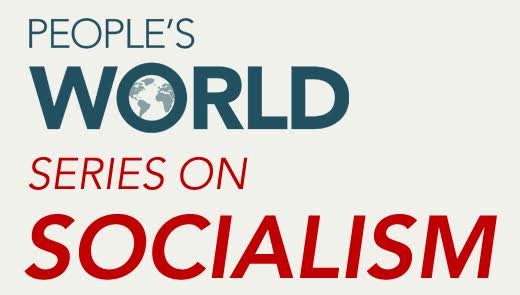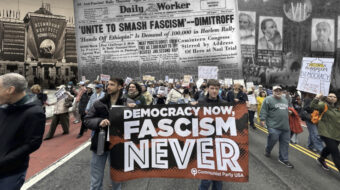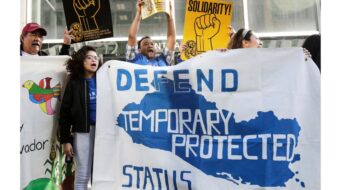
People’s World Series on Socialism
Everyone seems to be talking about socialism these days, but what does it mean? That was the question asked by Susan Webb in one of our most popular and widely-shared recent articles. Millions of Americans are considering alternatives to a system run by and for the 1 percent. They are taking an interest in socialism, a word that has meant a great many things to activists, trade unionists, politicians, and clergy around the world over the last century and a half. The article below is one of a series on socialism, what it can mean for Americans in the 21st century, and how we might get there.
I appreciate the invitation to respond to Sue Webb’s essay addressing a deeper discussion on a definition of socialism. Bernie Sanders’ campaign for president certainly has elevated this discussion to a national stage – masses of people in the U.S. are voting for a socialist for president, drawn by his unabashed progressive economic populist agenda. This, in and of itself, is an advance over decades of anti-communist, anti-socialist propaganda. Sanders has given expression to a powerful progressive majority, and moved politics to the left, including the likely Democratic Party nominee.
The moment challenges us to get a bit more specific on how socialists define socialism. To speak to this, I would like to draw from the thinking of the Committees of Correspondence for Democracy and Socialism. In our Goals and Principles document, adopted in 2009, we say that the efforts to build socialism in the 20th century in uncharted territory were carried out under conditions of severe coercion from outside capitalist powers. In that context, the democratic soul of socialism was seriously undermined, the essential need for popular participation in building the system was largely unrealized, and economic advances were distorted by dogma.
For the 21st century, we agree, there is no blueprint for socialism. This we can all agree on – socialism cannot emerge from sentiment, ideology, or wish fulfillment. Socialism emerges because the working class, as it struggles around the crisis of everyday living, comes to recognize that it is a necessity.
Socialism is a democratic political system wherein the interests and organizations of the working class and its allies have attained and hold the preponderance of political power and play the leading role in society.
It is still a class society, but in a protracted transition to a future classless society. It will be a mixed economy, with both public and private capitalist ownership, for some time. There will still be a need for entrepreneurial startups, both as worker cooperatives and as private firms serving the common good. Capital markets and wage-labor markets will be sharply restricted and even abolished over time.
If needed, a stock market can exist for publicly-traded firms and investments abroad, but it will be strictly controlled. A stock transfer tax will be implemented. Gambling in derivatives will be prohibited. Fair trade agreements with other countries will be on a bilateral basis for mutual benefit. Socialism will feature planning to face the challenges of uneven development and harsh inequalities.
Socialism will guarantee democracy in the workplace and the right to unions; democracy in voting with representative government; a society in harmony with the natural environment; living-wage jobs, genuine full employment, and adequate security for those who cannot work; freedom to practice religion; full equality in all spheres between women and men, between Black, Latin, Asian, Native and white people, and for gay and lesbian, trans, and bi-sexual people.
The role of the armed forces under socialism will be transformed from occupying forces around the world in the interests of capital to defending the interests of people in time of natural disaster, for example. Local police under community control, a prison system based on the principle of restorative justice, non-violent conflict resolution and community-based rehabilitation will be established.
The starting point on the path to socialism today is the struggle to both safeguard and advance democratic openings. It will require new directions in our nation’s domestic and global policies, including: democratic control of the Federal Reserve that can channel stimulus funds to workers, not bankers; public ownership of banking and financial institutions that would place people’s resources in their own hands; and nationalization of energy to eliminate fossil fuels and move toward a clean energy economy. Democratic advances in housing, education, health care, affirmative action to address centuries of racial inequality, civil and human rights, voting rights and democratic electoral reforms, women’s reproductive rights, child care, environmental justice and reversing climate change – in sum, an all-sided progressive democratic agenda.
Whether Sanders or Clinton wins the Democratic Party nomination, the progressive movement has been strengthened in opposition to a virulently racist, sexist, homophobic, anti-immigrant, anti-communist/anti-socialist right wing centered in the Republican Party.
A key question for all of us is how do we translate the votes for Sanders into organization beyond the November elections? Needed is strength at the grass roots. Organizations like the Working Families Party, Progressive Democrats of America and other such forms that can mobilize around issues in communities and neighborhoods with electoral capacity at all levels of government are urgently needed.
The Sanders campaign signals that the time is ripe to step it up.
Pat Fry is co-chair of the Committees of Correspondence for Democracy and Socialism, is retired from the staff of a health care union, and lives in New York City.
See other articles in the series here.










